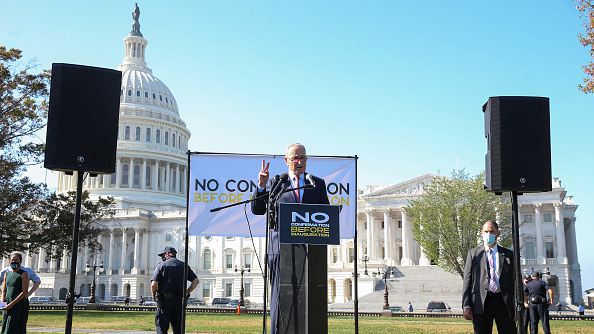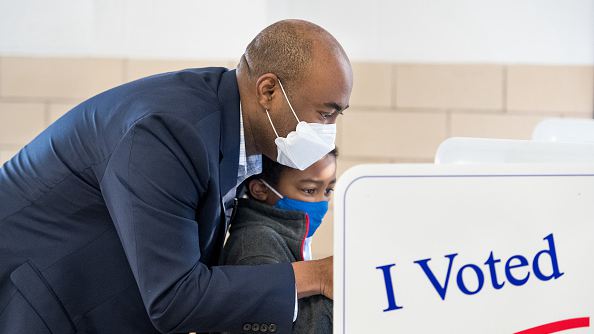The headline act of U.S. election season is the battle between Donald Trump and Joe Biden for the White House, but there has been just as much drama in down-ballot races likely to prove equally important to the direction the United States takes in 2021.
Interactive page: X Factors in the U.S. Election
With the Democrats expected to comfortably retain control of the House of Representatives, the battle for the 35 Senate seats contested this cycle will determine how much power the next president – whoever he is – will have to enact his agenda.
Why is Senate control important?
The clout of the winner of the presidential race, particularly on domestic policy, will be hugely swayed by the makeup of the Senate – if the presidency and the Senate are in different hands, the prospect of major legislation passing is minimal.
Biden in the White House with Republican Mitch McConnell still controlling the Senate is a recipe for gridlock – the Democrat would be unlikely to be able to pass legislation on key issues like healthcare, voting rights and climate change, and could struggle to confirm cabinet members or judges.

Mitch McConnell at a campaign stop in Smithfield, Kentucky, October 28, 2020. /Getty
Mitch McConnell at a campaign stop in Smithfield, Kentucky, October 28, 2020. /Getty
But if the Democrats secure a trifecta – control of the White House and Congress – the party will be well placed to make meaningful changes on a range of priorities ahead of the 2022 midterms.
If Trump is reelected with another Republican-majority, more of the same can be expected. But with Democrat Chuck Schumer in charge in the Senate, Trump would likely have a frustrating final four years in office – though realistically, if Trump wins there's little chance of the Democrats taking the Senate.
What do both sides need for control?
The Republicans currently have a 53-47 advantage in the 100-seat Senate, meaning the Democrats need a net gain of four in the 35 seats contested in 2020 to guarantee a majority.
A 50-50 tie in the Senate is broken by the vice president, so a net gain of three for the Democrats would put control of the chamber in the hands of whoever wins the White House.

Chuck Schumer speaks at a protest calling for the Senate to delay the confirmation of Supreme Court Justice Nominee Amy Coney Barrett at the U.S. Capitol, Washington, D.C., October 22, 2020. /Getty
Chuck Schumer speaks at a protest calling for the Senate to delay the confirmation of Supreme Court Justice Nominee Amy Coney Barrett at the U.S. Capitol, Washington, D.C., October 22, 2020. /Getty
In a reverse of the 2018 midterms, the Democrats have the advantage of defending fewer seats than their rivals. Twenty-three of the 35 contested seats currently lie in Republican hands and of the 14 viewed as competitive, only two are held by Democrats.
Democrats
The Democrats are defending 12 seats. One – won by Doug Jones against controversial Republican Roy Moore in Alabama – is leaning towards flipping back, according to the Cook Political Report, one is competitive but leaning Democratic, and the remaining 10 are solidly in the party's hands.
With Jones expected to lose in Alabama, the Democrats will likely need to gain four seats to secure a 50-50 tie and five for an outright majority.
Republicans
The Republicans are defending 23 seats. Two are leaning towards the Democrats, seven are toss-ups, a further three are competitive but trending Republican and the remaining 11 are highly likely to remain with McConnell's party.
If the Republicans flip back Alabama, they can afford to lose three seats they currently hold and still guarantee control of the Senate.
What are the races to watch?
Voting in the Senate races will end on November 3 and results will trickle in that evening, though as with the presidential election it may take days or even weeks for the final results to be reported.
Likely Republican pickups
Alabama: It is the top Republican target. Doug Jones beat the unpopular Roy Moore, a Republican accused of sexual misconduct, in the deep-red state in 2017. This time he has a more conventional opponent in Tommy Tuberville, a retired college football coach and Trump acolyte who defeated former Attorney General Jeff Sessions in the Republican primaries. Polls suggest Tuberville is on course for victory in a state Trump won by 28 points in 2016.
Likely Democratic pickups
Arizona: Democratic candidate Mark Kelly, a former astronaut whose wife Gabby Giffords, then a congresswoman, was the victim of an assassination attempt in 2011, is favored in most polls to win the seat from Republican incumbent Martha McSally, who lost the state's other Senate seat in 2018 and was appointed as a senator following the resignation of John McCain's replacement.

Mark Kelly debates Martha McSally in Phoenix, Arizona, October 6, 2020. /Getty
Mark Kelly debates Martha McSally in Phoenix, Arizona, October 6, 2020. /Getty
Colorado: Former Governor John Hickenlooper dropped out of the race for the Democratic presidential nomination early and put his name in the hat for the Senate. Hickenlooper, who co-founded one of the first brewpubs in the U.S., is leading Republican incumbent Cory Gardner in the polls in a seat Democrats must win if they are to take control of the Senate.
Possible Republican pickups
Michigan: It is the only other Democrat-held seat where the Republicans are serious contenders. Incumbent Gary Peters is facing a strong challenge from John James, a Black businessman and Iraq War veteran who has received heavy backing from his party.
Possible Democratic pickups
Georgia: Incumbent David Perdue and challenger Jon Ossoff are neck and neck in the battle for the first of two Georgia Senate seats up for grabs. If neither candidate hits 50 percent of the vote, a runoff would be held on January 5, potentially determining which party holds control of the Senate.
Georgia: The other Georgia race is a special election that will almost certainly head to a runoff on January 5. There were no primaries, so two big-name Republicans – appointed incumbent Kelly Loeffler and Congressman Doug Collins – are competing against one another as well as Democrat Raphael Warnock and 17 other candidates to pass the 50 percent threshold.

Kelly Loeffler talks with supporters during a campaign event in Buford, Georgia, October 28, 2020. /Getty
Kelly Loeffler talks with supporters during a campaign event in Buford, Georgia, October 28, 2020. /Getty
Iowa: Incumbent Joni Ernst is struggling to hold on in Iowa, where the decision to hug Trump close may end up counting against her. Polls put Democratic rival and businesswoman Theresa Greenfield – and Biden – narrowly ahead.
Maine: Four-term Republican Senator Susan Collins, the only Republican to vote against the confirmation of Amy Coney Barrett to the Supreme Court, is under pressure from well-funded challenger Sara Gideon, the speaker of the House in Maine.
Montana: Another former governor and contender for the Democratic presidential nomination, Steve Bullock, entered the Senate race late but remains within the margin of error in the few polls conducted in Montana, slightly behind Republican Steve Daines.

Jaime Harrison, challenger to Lindsey Graham, casts an early vote with his son William, Columbia, South Carolina, October 19, 2020. /Getty
Jaime Harrison, challenger to Lindsey Graham, casts an early vote with his son William, Columbia, South Carolina, October 19, 2020. /Getty
North Carolina: Incumbent Thom Tillis is back on the campaign trail after a bout of COVID-19, seemingly caught at the White House, but trails Democratic challenger Cal Cunningham, whose lead doesn't appear to have been hurt by a mid-campaign sex scandal.
South Carolina: It is the seat Democrats are desperate to win. Millions of dollars have poured into the coffers of Jaime Harrison, a Democrat attempting to defeat Lindsey Graham, the Trump critic turned Trump ally, but the Republican remains narrowly ahead in the polls.
Longshot Democratic pickups
Democrats are also eyeing up longer-shot contests, with well-funded challengers making Republican grandees feel the heat.
Senate majority leader and Democratic bete noire Mitch McConnell is facing an onslaught of cash from the campaign of Democratic challenger and former Marine pilot Amy McGrath in Kentucky, but polls suggest he is likely to hold on for a seventh term.
In Texas, Republican John Cornyn is in a tighter-than-expected race with former Air Force pilot MJ Hegar; in Alaska, the limited polling leaves open the possibility that Dan Sullivan could come under pressure from Democrat Al Gross; and in the contest for an open seat in Kansas, Republican Roger Marshall only narrowly leads his Democratic challenger Barbara Bollier in the polls.
00:58

Scan the QR code in the video above to check out CGTN's U.S. election interactive special for exclusive data as well as the latest news, explainers, cartoons and analysis.

